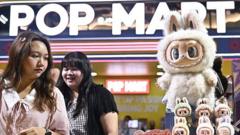In a remarkable turn of events, Pop Mart, the China-based toy company renowned for its quirky Labubu dolls, is predicting a staggering increase in profits—expected to rise by at least 350% in the first half of this year. The surge is a result of an impressive revenue increase, which has seen sales multiply over three times compared to last year.
With a market capitalization exceeding $40 billion, the company attributes this growth to heightened global brand awareness and stringent cost management strategies. The Labubu dolls, characterized by their distinctive elf-like appearance and pronounced teeth, have become a must-have collectible. The dolls’ immense popularity has led to sales crises in stores worldwide, as collectors eagerly hunt for rare items.
Notably, Pop Mart leverages a "blind box" sales strategy, wherein customers purchase packaged toys without knowing their contents until opened, sparking a rush similar to gambling. Since their debut in 2019, Labubu dolls have transformed Pop Mart into a retail powerhouse, boasting over 2,000 storefronts and vending locations globally.
After entering the Hong Kong Stock Exchange in 2020, Pop Mart’s stock value has skyrocketed by nearly 600% in the past year. Sales from outside China have become increasingly vital, contributing nearly 40% of total revenue during 2024. Despite overwhelming demand causing many stores to halt sales temporarily, Labubu dolls have thrived, particularly in the US, bolstered by endorsements from celebrities like Kim Kardashian and Blackpink's Lisa.
Additionally, collaborations with renowned brands such as Coca-Cola and the manga hit One Piece have further enhanced the visibility of Labubu dolls worldwide. According to equity research from M Science, US sales of Labubu toys soared by a staggering 5,000% in June compared to the previous year, with M Science analyst Vinci Zhang noting the exceptional nature of this phenomenon in the toy industry.
Though the company maintains a modest presence in the US with less than 40 stores compared to approximately 400 in China, the prospects for growth appear vast. The fervor for Labubu dolls has also ignited a booming secondary market, where original dolls, priced usually around $10, are now reselling for exorbitant amounts—one human-sized Labubu fetched a whopping $150,000 at a recent auction in Beijing.
However, this surge in popularity has led to an influx of counterfeit products, known as Lafufu dolls, prompting Chinese authorities to seize over 46,000 fake items in June as they tighten enforcement against the burgeoning black market. The world has taken notice of the Labubu dolls—adorable, eccentric, and undeniably collectible.





















